雅思听力之选择题
雅思英语听说读写全面测试 选择题 65题
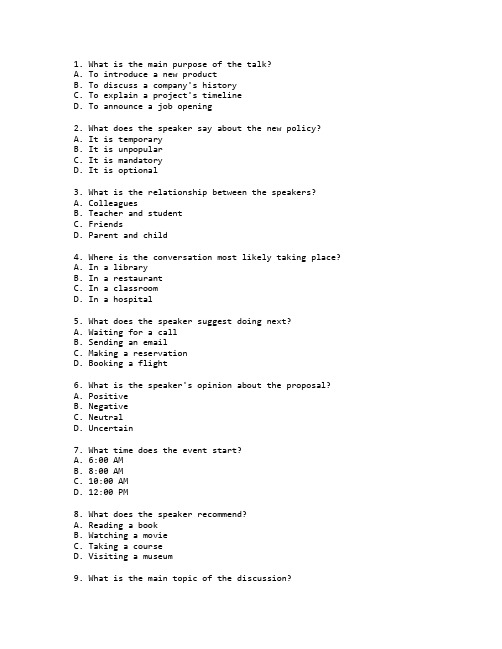
1. What is the main purpose of the talk?A. To introduce a new productB. To discuss a company's historyC. To explain a project's timelineD. To announce a job opening2. What does the speaker say about the new policy?A. It is temporaryB. It is unpopularC. It is mandatoryD. It is optional3. What is the relationship between the speakers?A. ColleaguesB. Teacher and studentC. FriendsD. Parent and child4. Where is the conversation most likely taking place?A. In a libraryB. In a restaurantC. In a classroomD. In a hospital5. What does the speaker suggest doing next?A. Waiting for a callB. Sending an emailC. Making a reservationD. Booking a flight6. What is the speaker's opinion about the proposal?A. PositiveB. NegativeC. NeutralD. Uncertain7. What time does the event start?A. 6:00 AMB. 8:00 AMC. 10:00 AMD. 12:00 PM8. What does the speaker recommend?A. Reading a bookB. Watching a movieC. Taking a courseD. Visiting a museum9. What is the main topic of the discussion?A. HealthB. TechnologyC. EducationD. Environment10. What does the speaker imply about the situation?A. It is improvingB. It is worseningC. It is stableD. It is unpredictable11. What is the speaker's main concern?A. SafetyB. CostC. QualityD. Efficiency12. What does the speaker want to know?A. The dateB. The locationC. The participantsD. The agenda13. What is the speaker's attitude towards the idea?A. SupportiveB. SkepticalC. IndifferentD. Critical14. What does the speaker mention as a possible solution?A. Hiring more staffB. Reducing hoursC. Increasing pricesD. Expanding services15. What is the speaker's final decision?A. To agreeB. To disagreeC. To postponeD. To reconsider#### 阅读部分(共20题)16. What is the main idea of the passage?A. The history of a cityB. The benefits of a dietC. The impact of technologyD. The challenges of climate change17. What does the author suggest about the topic?A. It is controversialB. It is widely acceptedC. It is misunderstoodD. It is irrelevant18. What is the tone of the article?A. OptimisticB. PessimisticC. InformativeD. Humorous19. What is the author's main argument?A. For changeB. Against changeC. For status quoD. Against status quo20. What does the passage imply about the future?A. UncertaintyB. ProgressC. DeclineD. Stability21. What is the purpose of the passage?A. To entertainB. To persuadeC. To informD. To criticize22. What is the main conflict in the story?A. Between two charactersB. Between a character and societyC. Between a character and natureD. Between a character and themselves23. What does the author conclude?A. A solutionB. A problemC. A questionD. A statement24. What is the main theme of the passage?A. LoveB. WarC. FreedomD. Justice25. What does the author recommend?A. A bookB. A courseC. A practiceD. A policy26. What is the main character's motivation?A. RevengeB. LoveC. AmbitionD. Fear27. What is the setting of the story?A. A cityB. A countrysideC. A desertD. An island28. What is the author's perspective on the issue?A. PositiveB. NegativeC. NeutralD. Mixed29. What is the main challenge faced by the protagonist?A. PhysicalB. MentalC. EmotionalD. Social30. What does the passage suggest about human nature?A. It is goodB. It is evilC. It is complexD. It is simple31. What is the main lesson of the story?A. To be braveB. To be kindC. To be wiseD. To be patient32. What is the author's main concern?A. EnvironmentB. EconomyC. EducationD. Ethics33. What is the main cause of the problem?A. Human errorB. Natural disasterC. Technological failureD. Political conflict34. What is the author's solution to the problem?A. A new lawB. A new technologyC. A new approachD. A new attitude35. What is the main impact of the event?A. PositiveB. NegativeC. NeutralD. Mixed#### 写作部分(共15题)36. What is the most important factor in a successful essay?A. OrganizationB. VocabularyC. GrammarD. Creativity37. What should be included in an introduction?A. Thesis statementB. ConclusionC. Personal opinionD. Detailed analysis38. What is the purpose of a thesis statement?A. To summarize the essayB. To introduce the topicC. To state the main argumentD. To provide background information39. What is the best way to develop a paragraph?A. By listing factsB. By using examplesC. By repeating ideasD. By asking questions40. What is the role of coherence in writing?A. To make the text interestingB. To make the text easy to readC. To make the text persuasiveD. To make the text creative41. What is the most effective way to conclude an essay?A. By restating the thesisB. By introducing new ideasC. By asking a questionD. By making a prediction42. What is the purpose of using transitions?A. To connect sentencesB. To emphasize pointsC. To add detailsD. To introduce new topics43. What is the best way to improve vocabulary?A. By reading extensivelyB. By memorizing wordsC. By using a dictionaryD. By taking vocabulary tests44. What is the most common error in student essays?A. Spelling mistakesB. Grammatical errorsC. Lack of evidenceD. Poor structure45. What is the purpose of a topic sentence?A. To introduce the paragraphB. To summarize the paragraphC. To state the main ideaD. To conclude the paragraph46. What is the best way to avoid plagiarism?A. By using quotesB. By paraphrasingC. By citing sourcesD. By summarizing47. What is the most important skill in academic writing?A. CreativityB. PersuasionC. AnalysisD. Description48. What is the purpose of an outline?A. To organize ideasB. To write the essayC. To revise the essayD. To edit the essay49. What is the best way to revise an essay?A. By reading it aloudB. By asking for feedbackC. By checking grammarD. By adding more details50. What is the most effective way to use evidence in an essay?A. To support the thesisB. To introduce the topicC. To summarize the essayD. To conclude the essay#### 口语部分(共15题)51. What is the best way to start a conversation?A. By asking a questionB. By making a statementC. By introducing yourselfD. By complimenting the other person52. What is the most important aspect of a presentation?A. ContentB. DeliveryC. AppearanceD. Timing53. What should you do if you forget what to say during a presentation?A. Pause and thinkB. Skip the pointC. Admit the mistakeD. Continue without missing a beat54. What is the best way to handle nervousness before speaking?A. Practice moreB. Take deep breathsC. Focus on the audienceD. Think positively55. What is the purpose of using gestures in speech?A. To emphasize pointsB. To entertain the audienceC. To fill pausesD. To look confident56. What is the most effective way to respond to a question in a debate?A. By agreeingB. By disagreeingC. By clarifying the questionD. By ignoring the question57. What is the best way to make a speech interesting?A. By using humorB. By using statisticsC. By using personal storiesD. By using quotes58. What is the most important skill in public speaking?A. ConfidenceB. ClarityC. CreativityD. Persuasion59. What is the purpose of eye contact in a conversation?A. To show interestB. To avoid distractionsC. To look confidentD. To end the conversation60. What is the best way to handle a difficult question in an interview?A. By answering honestlyB. By avoiding the questionC. By asking for clarificationD. By changing the topic61. What is the most important factor in a successful interview?A. PreparationB. AppearanceC. ConfidenceD. Experience62. What is the best way to end a conversation?A. By summarizing the pointsB. By asking a final questionC. By thanking the other personD. By making a joke63. What is the purpose of a rehearsal in public speaking?A. To memorize the speechB. To practice deliveryC. To check the timingD. To prepare the audience64. What is the most effective way to handle criticism in a speech?A. By accepting itB. By denying itC. By explaining your pointD. By ignoring it65. What is the best way to improve speaking skills?A. By watching videosB. By reading booksC. By practicing regularlyD. By taking courses### 答案1. C2. C3. A4. B5. C6. A7. B8. C9. D10. A11. B12. D13. B14. A15. C16. D17. A18. C19. A20. B21. C22. B23. A24. C25. D26. C27. A28. B29. B30. C31. D32. A33. A34. C35. B36. A37. A38. C39. B40. B41. A42. A43. A44. B45. C46. C47. C48. A49. B50. A51. A52. B53. A54. B55. A56. C57. C58. A59. A60. C61. A62. C63. B64. A65. C。
雅思考试听力历年真题详解2024版

雅思考试听力历年真题详解2024版雅思考试听力部分是考生们最为困扰的一部分,因为听力对于非母语人士来说是一项挑战。
为了帮助考生们更好地应对雅思听力考试,本文将为大家详细解析2024年雅思考试听力历年真题。
第一部分:选择题在雅思考试的听力部分,选择题是最常见的题型之一。
这类题型要求考生在听到录音后,从多个选项中选择一个正确答案。
下面我们来看一道真题的解析:题目:What does the man suggest the woman do?录音内容:Man: I think you should take a break. You've been working so hard lately.Woman: You're right. I've been feeling really tired.选项:A. Take a vacationB. Work harderC. Continue workingD. Take a break解析:根据录音内容,男人建议女人休息一下。
所以正确答案是D 项,即"Take a break"。
第二部分:填空题填空题是听力考试的另一种经典题型。
考生需要在听到录音后,从题目中给出的选项中选择合适的单词或短语填入空格内。
下面是一道精选真题的解析:题目:According to the speaker, the new shopping center will have a________ store.录音内容:Speaker: The new shopping center will have a variety of stores, including a department store, a grocery store, and a ________ store.选项:A. clothingB. shoeC. bookD. electronics解析:根据录音内容,演讲者提到新购物中心将有各种各样的商店,包括一个百货商店、一个杂货店和一个书店。
雅思听力真题回顾与分析
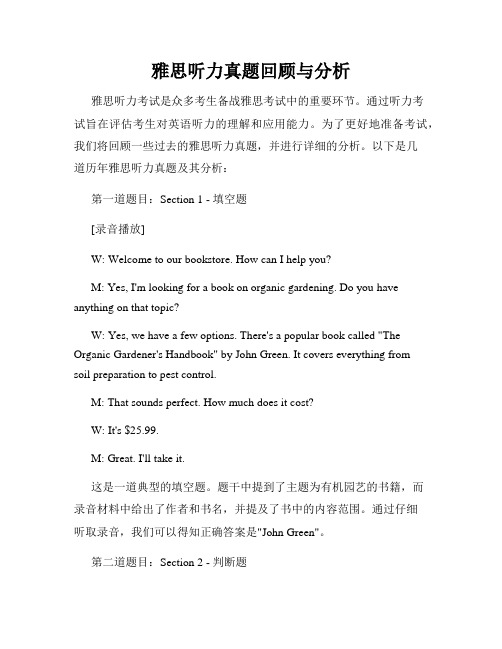
雅思听力真题回顾与分析雅思听力考试是众多考生备战雅思考试中的重要环节。
通过听力考试旨在评估考生对英语听力的理解和应用能力。
为了更好地准备考试,我们将回顾一些过去的雅思听力真题,并进行详细的分析。
以下是几道历年雅思听力真题及其分析:第一道题目:Section 1 - 填空题[录音播放]W: Welcome to our bookstore. How can I help you?M: Yes, I'm looking for a book on organic gardening. Do you have anything on that topic?W: Yes, we have a few options. There's a popular book called "The Organic Gardener's Handbook" by John Green. It covers everything fromsoil preparation to pest control.M: That sounds perfect. How much does it cost?W: It's $25.99.M: Great. I'll take it.这是一道典型的填空题。
题干中提到了主题为有机园艺的书籍,而录音材料中给出了作者和书名,并提及了书中的内容范围。
通过仔细听取录音,我们可以得知正确答案是"John Green"。
第二道题目:Section 2 - 判断题[录音播放]M: Good afternoon, everyone. Today, we have a special guest speaker - Dr. Anna Roberts. Dr. Roberts is a renowned marine biologist with over 20 years of research experience. She will be talking to us about the impact of climate change on marine ecosystems. Please give her a warm welcome.女士的身份被描述为一位著名的海洋生物学家,这表明她对相关主题有深入的研究。
雅思听力填空题和选择题的做题方法
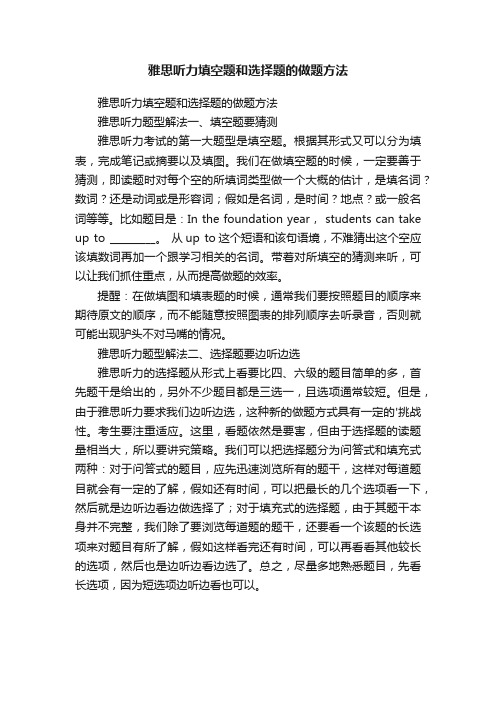
雅思听力填空题和选择题的做题方法雅思听力填空题和选择题的做题方法雅思听力题型解法一、填空题要猜测雅思听力考试的第一大题型是填空题。
根据其形式又可以分为填表,完成笔记或摘要以及填图。
我们在做填空题的时候,一定要善于猜测,即读题时对每个空的所填词类型做一个大概的估计,是填名词?数词?还是动词或是形容词;假如是名词,是时间?地点?或一般名词等等。
比如题目是:In the foundation year, students can take up to _________。
从up to这个短语和该句语境,不难猜出这个空应该填数词再加一个跟学习相关的名词。
带着对所填空的猜测来听,可以让我们抓住重点,从而提高做题的效率。
提醒:在做填图和填表题的时候,通常我们要按照题目的顺序来期待原文的顺序,而不能随意按照图表的排列顺序去听录音,否则就可能出现驴头不对马嘴的情况。
雅思听力题型解法二、选择题要边听边选雅思听力的选择题从形式上看要比四、六级的题目简单的多,首先题干是给出的,另外不少题目都是三选一,且选项通常较短。
但是,由于雅思听力要求我们边听边选,这种新的做题方式具有一定的'挑战性。
考生要注重适应。
这里,看题依然是要害,但由于选择题的读题量相当大,所以要讲究策略。
我们可以把选择题分为问答式和填充式两种:对于问答式的题目,应先迅速浏览所有的题干,这样对每道题目就会有一定的了解,假如还有时间,可以把最长的几个选项看一下,然后就是边听边看边做选择了;对于填充式的选择题,由于其题干本身并不完整,我们除了要浏览每道题的题干,还要看一个该题的长选项来对题目有所了解,假如这样看完还有时间,可以再看看其他较长的选项,然后也是边听边看边选了。
总之,尽量多地熟悉题目,先看长选项,因为短选项边听边看也可以。
雅思听力训练之选择题及其他
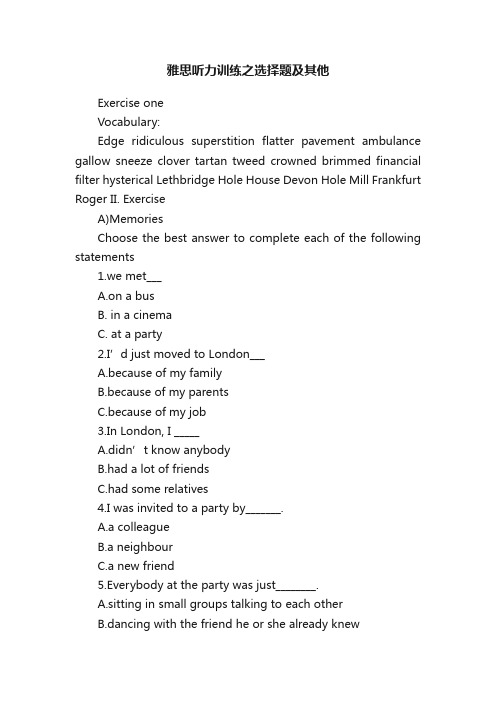
雅思听力训练之选择题及其他Exercise oneVocabulary:Edge ridiculous superstition flatter pavement ambulance gallow sneeze clover tartan tweed crowned brimmed financial filter hysterical Lethbridge Hole House Devon Hole Mill Frankfurt Roger II. ExerciseA)MemoriesChoose the best answer to complete each of the following statements1.we met___A.on a busB. in a cinemaC. at a party2.I’d just moved to London___A.because of my familyB.because of my parentsC.because of my job3.In London, I _____A.didn’t know anybodyB.had a lot of friendsC.had some relatives4.I was invited to a party by_______.A.a colleagueB.a neighbourC.a new friend5.Everybody at the party was just________.A.sitting in small groups talking to each otherB.dancing with the friend he or she already knewC.eating and drinking6.I was feeling really________.A.happy getting to know so many peopleB.lonesome with nobody to talk toC.bored with the whole thing7.an attractive girl was looking ____among the people.A.boredB. excitedC. happy8.___________to start a conversation.A.we went up to the barB.I went to herC.She came to me9 It turned out that____.A. we had nothing in commonB. we had quite a bit in commonC. we had something in common10. That’s _______.A. the beginning of our acquaintanceB. the end of our acquaintanceC. how we decided to get married.B. Married life1. Where does this dialogue most probably take place?A. in a cinemaB. at the speaker’s homeC. at a party2. what is the relationship between the speakers?A. husband and wifeB. Mother and sonC. father and daughter3. what are the speakers doing ?A. recalling the past nostalgically]B. seeing a film togetherC. having a quarrel4. which of the following is the thing that they used to do and are stilling doing now?A. running barefoot through the parkB. going to the cinema togetherC. going out for a walk5. which of he following statements summarizes the man’s ideas?A. they shouldn’t have got m arried.B. life is not as interesting as beforeC. they should do more silly things together6. what is the woman’s response toward the man’s complaitns?A. she is delightedB. She is enthusiasticC. She is confused and angery7. what will the woman do?A. she will go out to have a walkB. she will go to the cinema aloneC. she will go to live with her parentsD.Ghost1.This story happened___________.A.on a Sunday morningB.on a Saturday morningC.on a Friday morning2.My wife and I _______A.were admiring the viewB.were waiting for the mailC.were waiting for the visit from Mrs. N3.The Hole Mill belongs to _______A.my wifeB.Mrs. NC.Me4.Mrs. N was dressed in_______A.a blue sweater and dark blue tartan trousersB. a light blue sweater and blue tartan trousersC. a dark blue sweater and blue tartan trousers5.A second figure appeared__________A.behind the hillB.behind the millC.behind Mrs. N6.She looked about______.A.fifty—five to seventy years oldB.sixty to seventy years oldC.sixty—five seventy years oldE) a strange story1. what is the story about________?A. how superstitious the speaker isB. how he has become superstitiousC. A ghost story the speaker has imagined2. when did the story take place?A. two years agoB. two months agoC. two weeks ago3. where was the speaker living at that time?A. FranceB. Frankfort, GermanyC. Franklin4. what did he do at that time?A. he was a businessmanB. he was involved in financeC. he was a reporter on finance5. Which of the following statements is not true?A. the visitor was one of the speaker’s closest friendsB. the visitor and the speaker went to the same universityC. the visitor would come by train6. when did the telephone ring for the first time?A. at three Saturday morningB. at three Saturday afternoonC. at three Sunday morning7. how many times did the telephone ring?A. TwiceB. three timesC. four times8. what was the speaker doing when there was a knock at the door?A. he was boiling some waterB. he was cooking in the kitchenC. he was making some coffee9. which of the following does not describe Roger?A. man of a few wordsB. IntrovertC. Talkative10. what did the speaker do after letting Roger in?A. he sat down and talked with RogerB. He went to the kitchen to bring out the coffeeC. he went to the kitchen to finish pouring the coffee。
雅思听力选择题答题技巧
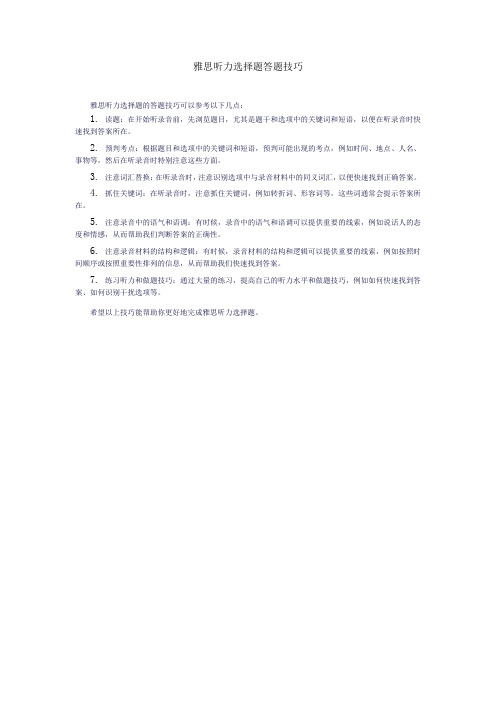
雅思听力选择题答题技巧
雅思听力选择题的答题技巧可以参考以下几点:
1.读题:在开始听录音前,先浏览题目,尤其是题干和选项中的关键词和短语,以便在听录音时快速找到答案所在。
2.预判考点:根据题目和选项中的关键词和短语,预判可能出现的考点,例如时间、地点、人名、事物等,然后在听录音时特别注意这些方面。
3.注意词汇替换:在听录音时,注意识别选项中与录音材料中的同义词汇,以便快速找到正确答案。
4.抓住关键词:在听录音时,注意抓住关键词,例如转折词、形容词等,这些词通常会提示答案所在。
5.注意录音中的语气和语调:有时候,录音中的语气和语调可以提供重要的线索,例如说话人的态度和情感,从而帮助我们判断答案的正确性。
6.注意录音材料的结构和逻辑:有时候,录音材料的结构和逻辑可以提供重要的线索,例如按照时间顺序或按照重要性排列的信息,从而帮助我们快速找到答案。
7.练习听力和做题技巧:通过大量的练习,提高自己的听力水平和做题技巧,例如如何快速找到答案、如何识别干扰选项等。
希望以上技巧能帮助你更好地完成雅思听力选择题。
雅思考试2024听力历年题目全解

雅思考试2024听力历年题目全解雅思考试是世界上最为知名和广泛应用的英语语言能力考试之一。
考试分为听力、阅读、写作和口语四个部分,而听力部分往往是许多考生最为头疼的一部分。
本文将为大家提供2024年雅思考试听力部分的历年题目全解,帮助考生们更好地备考和应对这一考题。
一、Section 1问题1:对话内容涉及到哪个话题?解答:根据对话中的信息,我们可以判断出对话涉及到了旅行安排的话题。
问题2:主要讨论了什么?解答:对话主要讨论了出行日期和旅行行程。
问题3:根据对话内容,回答以下选择题:1) 旅行行程将于哪一天开始?解答:根据对话,旅行行程将于星期五开始。
2) 旅行行程将持续多少天?解答:根据对话,旅行行程将持续5天。
二、Section 2问题1:讲座的主题是什么?解答:根据讲座的内容,我们可以判断出主题是关于环境保护的。
问题2:根据讲座内容,回答以下选择题:1) 为了保护环境,我们应该减少什么?解答:根据讲座,我们应该减少对塑料制品的使用。
2) 什么是可持续发展?解答:根据讲座,可持续发展是指在满足当前需求的同时,不会对未来世代造成不可逆转的影响。
三、Section 3问题1:这段对话主要讨论了什么?解答:对话主要讨论了一个学术研究项目的进展情况。
问题2:根据对话内容,回答以下选择题:1) 他们打算用哪种方法来收集数据?解答:根据对话,他们打算用在线问卷调查的方式来收集数据。
2) 这个研究项目的最终目标是什么?解答:根据对话,这个研究项目的最终目标是为社会提供更好的健康服务。
四、Section 4问题1:演讲的主题是什么?解答:演讲的主题是关于人类大脑的研究。
问题2:根据演讲内容,回答以下选择题:1) 人类大脑有多少个不同的神经元?解答:根据演讲,人类大脑有约1000亿个不同的神经元。
2) 哪一边的大脑对语言能力的掌握更强?解答:根据演讲,左侧大脑对语言能力的掌握更强。
综上所述,本文对2024年雅思考试听力部分的历年题目进行了全解,涵盖了Section 1至Section 4的各类题型。
雅思听力之选择题
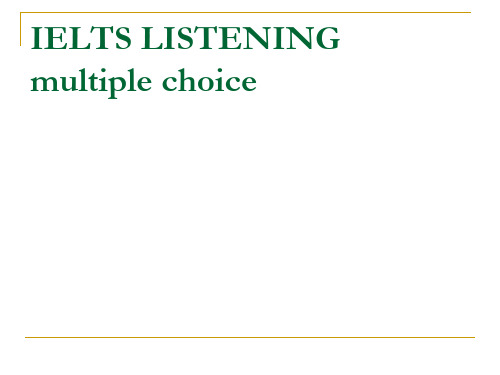
Paraphrases and synonyms
Also, sentences and words that you hear in the listening will often be changed in the actual listening script. The test would be quite easy if you could heard exactly what you see in the question, but it will be changed in some way.
How do you answer multiple choice questions?
What you need to do is look through the questions. You have 30 seconds to do this before you hear the audio.
Strategies – Test Tips
Your purpose of listening is to identify what the question requires you to do It is not necessary to understand every word that is spoken You will hear the information once only, so prepare yourself by anticipating what you will hear Read and analyse the question as pre-listening task
雅思听力 题型
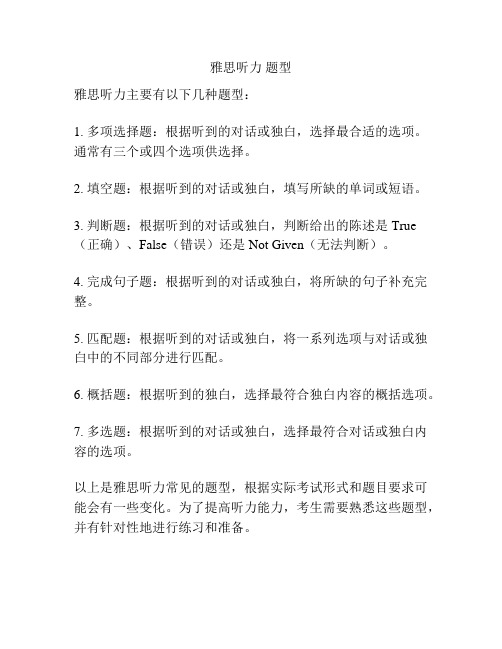
雅思听力题型
雅思听力主要有以下几种题型:
1. 多项选择题:根据听到的对话或独白,选择最合适的选项。
通常有三个或四个选项供选择。
2. 填空题:根据听到的对话或独白,填写所缺的单词或短语。
3. 判断题:根据听到的对话或独白,判断给出的陈述是True (正确)、False(错误)还是Not Given(无法判断)。
4. 完成句子题:根据听到的对话或独白,将所缺的句子补充完整。
5. 匹配题:根据听到的对话或独白,将一系列选项与对话或独白中的不同部分进行匹配。
6. 概括题:根据听到的独白,选择最符合独白内容的概括选项。
7. 多选题:根据听到的对话或独白,选择最符合对话或独白内容的选项。
以上是雅思听力常见的题型,根据实际考试形式和题目要求可能会有一些变化。
为了提高听力能力,考生需要熟悉这些题型,并有针对性地进行练习和准备。
Rachel_雅思听力选择题

S2选择题考点与S3考 点技巧
S2选择题考点:
1)连词: 并列连词:and, or, as well, ... 转折连词: but, however, while, in fact, actually, ... 2) 否定词 直接否定:not, don't, never, ... 用肯定的形式表否定: against, oppose, reject, ... 3)根据选项判断 n.~ v.~ 限定词 A.1~ 2~ 3~ B.1~ 2~ 3~ C.1~ 2~ 3~
24. A. 张冠李戴;B. 未提及C. (√);
易错点分析
易错点分析:
1. 听到原单词直接开始写(最常见); 2.听问题走神不知道定位在哪里; 3.不利用归纳技巧听到前半段就开始选; 4. 没有词汇完全听不懂在讲什么内容;
ps: 一般情况下,选项会听到一个原词,其他词被同义替换
(C7T1S2)
9分达人4 T1S2
11. A无largest; B不是in the world, 限 定词错误;C but后面的转折 (√);
12. A nothing better 定位
雅思听力-选择题
Rachel
昆明南屏校区
2019.09.09
Content
选择题题型特 点分析以及勾
画关键词
01
S2选择题 考点与S3 考点技巧
02
易错点分析
03
精听练习
04
选择题题型特点 分析以及勾画关
键词
题型特点:
1.多出现在S2 & S3部分(S4部分选择题难度较大); 2.可能3个选项都会出现; 3.需要快速提取关键信息; 4. 适度做笔记(同义替换)。
雅思英语学术听力与口语考试 选择题 62题
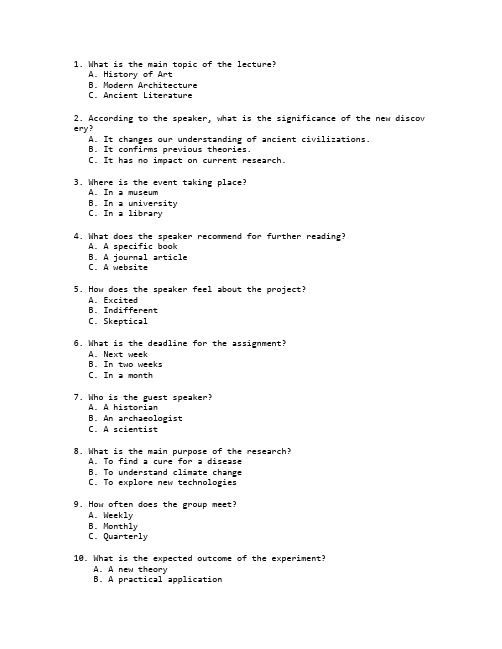
1. What is the main topic of the lecture?A. History of ArtB. Modern ArchitectureC. Ancient Literature2. According to the speaker, what is the significance of the new discov ery?A. It changes our understanding of ancient civilizations.B. It confirms previous theories.C. It has no impact on current research.3. Where is the event taking place?A. In a museumB. In a universityC. In a library4. What does the speaker recommend for further reading?A. A specific bookB. A journal articleC. A website5. How does the speaker feel about the project?A. ExcitedB. IndifferentC. Skeptical6. What is the deadline for the assignment?A. Next weekB. In two weeksC. In a month7. Who is the guest speaker?A. A historianB. An archaeologistC. A scientist8. What is the main purpose of the research?A. To find a cure for a diseaseB. To understand climate changeC. To explore new technologies9. How often does the group meet?A. WeeklyB. MonthlyC. Quarterly10. What is the expected outcome of the experiment?A. A new theoryB. A practical applicationC. A detailed report第11-20题:选择正确的答案11. What is the speaker's main argument?A. Technology is harmful.B. Technology is beneficial.C. Technology has no impact.12. How does the speaker suggest improving the situation?A. By reducing usageB. By increasing awarenessC. By ignoring the issue13. What is the main challenge discussed?A. Financial constraintsB. Lack of resourcesC. Political interference14. What is the speaker's opinion on the new policy?A. SupportiveB. CriticalC. Neutral15. What is the main focus of the discussion?A. Environmental issuesB. Social issuesC. Economic issues16. What is the main reason for the delay?A. Technical problemsB. Administrative issuesC. Weather conditions17. What is the speaker's role in the project?A. LeaderB. AssistantC. Observer18. What is the main benefit of the new system?A. EfficiencyB. Cost reductionC. User-friendliness19. What is the main concern expressed by the speaker?A. SafetyB. PrivacyC. Accessibility20. What is the main goal of the initiative?A. To raise fundsB. To increase participationC. To improve services第21-30题:选择正确的答案21. What is the main theme of the documentary?A. Wildlife conservationB. Human rightsC. Cultural heritage22. What is the speaker's main point?A. To informB. To persuadeC. To entertain23. What is the main source of conflict?A. Personal differencesB. Ideological differencesC. Resource scarcity24. What is the speaker's main recommendation?A. To take immediate actionB. To wait and seeC. To ignore the problem25. What is the main obstacle discussed?A. Lack of fundingB. Lack of supportC. Lack of interest26. What is the speaker's main achievement?A. Winning an awardB. Completing a projectC. Publishing a book27. What is the main impact of the change?A. PositiveB. NegativeC. Neutral28. What is the speaker's main concern?A. QualityB. QuantityC. Timeliness29. What is the main focus of the research?A. Historical eventsB. Scientific phenomenaC. Social trends30. What is the main reason for the success?A. Hard workB. LuckC. Support from others口语部分第31-40题:选择正确的答案31. What is your favorite book and why?A. Fiction because it's engaging.B. Non-fiction because it's informative.C. Poetry because it's inspiring.32. How do you manage stress?A. ExerciseB. MeditationC. Hobbies33. What is your opinion on remote work?A. PreferableB. Not suitableC. Depends on the situation34. How do you stay motivated?A. Setting goalsB. Rewarding myselfC. Seeking support35. What is your favorite holiday and why?A. Christmas for the family time.B. Summer vacation for the travel.C. New Year's Eve for the celebrations.36. How do you balance work and personal life?A. Prioritizing tasksB. Setting boundariesC. Delegating responsibilities37. What is your opinion on technology in education?A. Very beneficialB. OverratedC. Needs moderation38. How do you handle conflicts?A. Communicating openlyB. Avoiding confrontationC. Seeking mediation39. What is your favorite way to relax?A. ReadingB. Watching moviesC. Spending time outdoors40. How do you plan for the future?A. Setting long-term goalsB. Living in the momentC. Preparing for uncertainties第41-50题:选择正确的答案41. What is your opinion on climate change?A. A serious issueB. ExaggeratedC. Not convinced42. How do you contribute to environmental conservation?A. RecyclingB. Reducing consumptionC. Supporting green initiatives43. What is your favorite type of music and why?A. Classical for its complexity.B. Pop for its catchiness.C. Jazz for its improvisation.44. How do you handle criticism?A. Taking it constructivelyB. Ignoring itC. Getting defensive45. What is your opinion on social media?A. A great tool for connection.B. A distraction.C. A necessary evil.46. How do you stay informed about current events?A. Reading news articlesB. Watching news channelsC. Listening to podcasts47. What is your favorite way to exercise?A. RunningB. YogaC. Team sports48. How do you handle pressure?A. Staying organizedB. Seeking helpC. Taking breaks49. What is your opinion on artificial intelligence?A. Exciting developmentB. Potential threatC. Not interested50. How do you celebrate success?A. With a partyB. With a rewardC. By setting new goals第51-62题:选择正确的答案51. What is your opinion on international travel?A. EnrichingB. OverratedC. Not feasible52. How do you handle cultural differences?A. With respectB. By ignoring themC. With discomfort53. What is your favorite cuisine and why?A. Italian for its variety.B. Japanese for its freshness.C. Indian for its spices.54. How do you handle disappointment?A. By learning from itB. By moving on quicklyC. By seeking support55. What is your opinion on lifelong learning?A. EssentialB. OverratedC. Not necessary56. How do you handle change?A. Embrace itB. Resist itC. Adapt gradually57. What is your favorite season and why?A. Spring for the renewal.B. Summer for the warmth.C. Autumn for the colors.58. How do you handle difficult decisions?A. By weighing pros and consB. By seeking adviceC. By trusting my instincts59. What is your opinion on volunteer work?A. Very rewardingB. Time-consumingC. Not for me60. How do you handle success?A. With humilityB. With prideC. With indifference61. What is your favorite hobby and why?A. Painting for creativity.B. Cooking for relaxation.C. Gardening for connection with nature.62. How do you handle failure?A. By learning from itB. By ignoring itC. By seeking comfort答案1. B2. A3. A4. B5. A6. B7. B8. A9. A10. B11. B12. B13. A14. A15. B16. A17. A18. A19. B20. C21. A22. B23. B24. A25. A26. B27. A28. A29. B30. A31. A32. B33. A34. A35. B36. B37. A38. A39. C40. A41. A42. B43. C44. A45. A46. B47. A48. C49. A50. B51. A52. A53. C54. A55. A56. A57. C58. A59. A60. A61. A62. A。
2024雅思考试重点听力历年考题总结

2024雅思考试重点听力历年考题总结随着雅思考试逐渐成为国内外出国留学、移民的热门考试之一,听力部分作为其中的一个重要单项,备受考生关注。
为了帮助考生更好地备考雅思听力,本文将对2024年历年雅思考试中的重点听力考题进行总结,以便考生能够更有效地复习重点内容。
第一部分:单选题1. 2009年5月9日考题题目:What type of fish did the girl catch?选项:A. SalmonB. TroutC. Bass2. 2011年6月15日考题题目:What is the main problem with the student's accommodation?选项:A. Too expensiveB. No heating systemC. Too far from the campus3. 2014年3月1日考题题目:What does the lecturer mainly discuss?选项:A. The advantages of fossil fuelsB. The negative impact of deforestationC. The importance of renewable energy4. 2018年9月12日考题题目:What is the purpose of the talk?选项:A. To introduce a new art exhibitionB. To promote an upcoming theater performanceC. To provide information about a film festival第二部分:填空题1. 2010年1月7日考题题目:The student must submit the assignment by __________.填空:Friday2. 2013年8月2日考题题目:The student's final project should focus on the impact of __________.填空:social media3. 2016年11月15日考题题目:The museum is hosting a temporary exhibition on __________.填空:ancient civilizations4. 2019年5月25日考题题目:The student needs to meet the professor during his __________.填空:office hours第三部分:多选题1. 2012年4月19日考题题目:Why was the woman disappointed with the accommodation?选项:A. The room was smaller than expectedB. The noise level was too highC. The location was inconvenient2. 2015年7月11日考题题目:What will the woman most likely do next?选项:A. Attend a conferenceB. Read a research paperC. Write an article3. 2017年12月3日考题题目:What does the man suggest about the lecture?选项:A. It will start lateB. It will be cancelledC. It will be rescheduled4. 2020年3月8日考题题目:What does the woman imply about the assignment?选项:A. It is due next weekB. It is a group projectC. It is optional第四部分:地图题1. 2010年10月17日考题题目:Which building is the bookstore?答案:Building 52. 2013年4月11日考题题目:What is located between the library and the computer lab?答案:Cafeteria3. 2016年9月9日考题题目:Where can the students find the sports complex?答案:To the south of the dormitories4. 2019年1月5日考题题目:Where is the student center?答案:Next to the main entrance通过对以上历年考题的总结,我们可以看到2024年雅思听力考试的重点内容主要包括单选题、填空题、多选题和地图题。
剑桥雅思听力(二)选择题(1)

make any assumption in comparison with
2023/4/13
吞音和连读
fulfill that expectation raise the grades leave out a lot of details affect the results investigate whether decide on
单词和词组
got confused at
were significant to
discipline
who mattetred to them
underrepresented
relax them and
enrol on
overcome psycho factors
perform poorly
underperforming
2023/4/13
育
泰
教
子
THANK YOU
THANKING FOR YOUR WATCHING
2023/4/13
2017
mixed team what worries me get everything done make any progress have a look at it that'd be better
2023/4/13
雅思听力四步法步法 1. 范听 2. 逐句听抄
2023/4/13
雅思听力四步法步 3. 逐字听抄 4. 复述
泰
子
育 教
雅思听力选择题
本期重点:
2017 划关键词;
单词和词组; 吞音及连读; 听力四步法。
划关键词练习
2023/4/13
2023/4/13
雅思听力之选择题
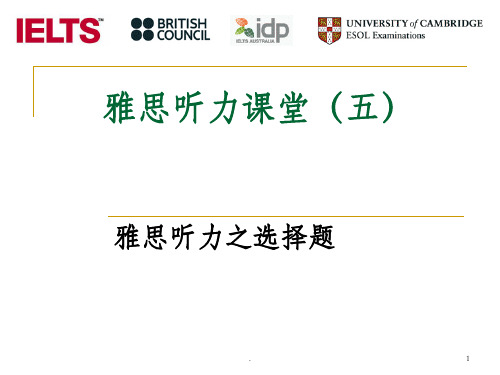
.
8
3:戳穿比较,有的放矢
雅思里的比较分为三类: 直接比较,即题目中包含有比较级和最高级的表达方式的题目; 间接比较,即题目中并没有直接的比较级和最高级,但是有诸如major,
.
6
思路透析:
乍一看题,有种蒙的感觉,因为选项较多,对于考生的快速阅读能力提出了 一定的挑战。
此时必须冷静,发现其中的规律。经过分析,选项A 、F 都谈到Internet,可 以归为一类;选项B、D、E 都与Dissertation 有关,归为第二类;选项C、G 中都有Library,归为第三类。
第三类隐含比较比较难,因为题干虽然无比较,但是选项里有比较的特点, 而且实际听力中又容易出现否定词搭配比较表达出现的形式,使考生的反应 时间和速度受到极大的影响,大大降低了解题正确率。
.
9
4:偷天换日,临阵脱逃
“如果你听到的内容几乎和某个选项一模一样的时候,那么这个选 项经常是要被排除的,并不是正确答案。”
.
2
雅思听力选择题特点
为了考查考生的听力理解能力,雅思听力中存在两大 阻力:Indirect Information间接信息与Trap干扰项。 特别是对于多项选择题,正确选项往往不像,干扰项 往往很像。
间接信息:录音中听到的内容与正确选项中的内容貌 离神合,经常是文字不一致,但意思一致。
干扰项:录音中听到的内容与若干错误选项中的内容 貌合神离,往往是文字一致,但意思风马牛不相及。
根据一定的特点把选项与干扰项进行了归类,根据类似选项形成互相干扰, 我们可以大胆的预测三类中各出一个正确答案,正好组成此题的最终答案。
雅思听力之单项选择题精讲PPT
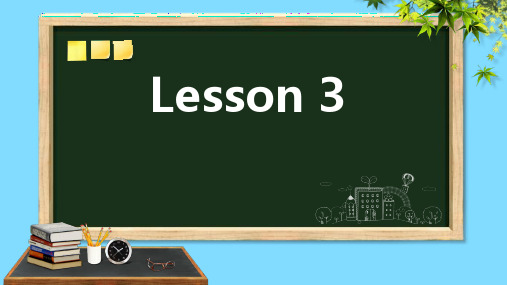
+
听力实力
读题 预测
排除
技巧
= 高分
例题:Where does Circus Romano perform? (C4-3-2)
A In a theater B In a tent C In a stadium
A In a theater B In a tent
C In a stadium
原文: As this is a traveling circus, it follows a long tradition by performing in a marquee- which is really like a canvas portable building, usually put up in a green
听力文章
定位词
答案
定位词:特别注意专有名词(人名,地名,
机构名),数字; 否定或排除意义的词(如not, except等),有助于定位答案的位置。
猜题 (排除法)
①有太绝对的词( never, none, all ,every, totally impossible, no ), 不选 。 ②用常识猜题,不合常理,不选。
③同类型选项, 一般会有一个正确答案。
例题:Entertainment is provided_______ (C4-4-2) A When guests request it B Most nights C Every night
③同类型选项, 一般会有一个正确答案。
例题:The number of students counselled by the service last year was___(4-2-2) A 214 B 240 C 2600
雅思真题11听力答案解析

雅思真题11听力答案解析雅思听力考试是很多考生最为困难的一项。
在雅思考试中,听力占有很大的比重,因此提前熟悉和解析真题的答案是至关重要的。
本文将对雅思真题11中的听力部分进行答案解析,帮助考生更好地备考。
第一部分:考题回顾及解析第一节:多选题题目: According to the speaker, what is the first development that led to the popularity of waltz in Vienna?答案解析:根据录音,说话人提到:“The first development was actually that the concert halls in Vienna were able toheat all of the spaces”.所以正确答案应该是C。
第二节:填空题题目: According to the speaker, what have most modern dance forms inherited from the Viennese waltz?答案解析:根据录音,说话人提到:“Something that thewaltz established was the idea that dance did not need a story,it was not purely abstract, but to some extent,it was a way of couples having a conversation in movement”.所以正确答案应该是stories。
第三节:选择题题目: Which aspect of the D'oultremont speech was the speaker critical of?答案解析:根据录音,说话人提到:“And the man who is saying that he is very excited by new technology, of courseis still being filmed by an 8mm black-and-white movie camera”.所以正确答案应该是B。
雅思听力练习试题库附答案解析

雅思听力练习试题库附答案解析Introduction:雅思听力是雅思考试的四个部分之一,也是考生们普遍认为最具挑战性的一部分。
为了帮助考生更好地备考雅思听力,本文将提供一系列雅思听力练习试题,并附带详细的答案解析,以便考生们进行自我评估和提高。
Section 1: Multiple Choice Questions1. Question: What is the main topic of the lecture?A) History of architectureB) Modern art movementsC) Famous paintersD) Impressionist techniquesAnswer: B) Modern art movementsExplanation: The lecturer discusses various art movements in the 20th century, such as Cubism and Surrealism, indicating that the main topic is modern art movements.2. Question: According to the lecture, what is a characteristic of Abstract Expressionism?A) Emphasis on geometric shapesB) Use of vibrant colorsC) Focus on historical eventsD) Representation of realistic figuresAnswer: B) Use of vibrant colorsExplanation: The lecturer mentions that Abstract Expressionism artists often used bold, vibrant colors in their artworks, indicating that it is a characteristic of this art movement.Section 2: Note CompletionIn this section, you will listen to a conversation between a student and an advisor. Complete the notes below.Advisor: So, based on your interests and skills, I recommend you consider the following majors:1. ________2. ________3. ________Answer:1. Sociology2. Environmental Science3. Communication StudiesExplanation: The advisor suggests three possible majors for the student - Sociology, Environmental Science, and Communication Studies. These options are based on the student's interests and skills.Section 3: MatchingMatch each statement with the appropriate person.Person A) Sally ThompsonPerson B) Mark DavisPerson C) Professor Johnson1. ________ specializes in environmental studies.2. ________ is an expert in ancient history.3. ________ is offering a seminar on poetry.Answer:1. Person B) Mark Davis2. Person A) Sally Thompson3. Person C) Professor JohnsonExplanation: The lecturer introduces three individuals and their areas of expertise. By matching the statements with the appropriate person, we can identify Mark Davis as the specialist in environmental studies, Sally Thompson as the expert in ancient history, and Professor Johnson as the person offering a seminar on poetry.Conclusion:通过这些提供的雅思听力练习试题以及相应的答案解析,考生们可以更好地了解雅思听力考试的题型和考点。
雅思英语语言测试听力理解 选择题 60题

1. What is the main topic of the conversation?A. Travel plansB. Restaurant reviewC. Movie discussionD. Sports event2. Where is the speaker originally from?A. CanadaB. AustraliaC. EnglandD. South Africa3. What does the woman suggest they do next?A. Go to the libraryB. Visit a museumC. Have lunchD. Watch a movie4. How does the man feel about the proposal?A. ExcitedB. IndifferentC. WorriedD. Confused5. What time does the train leave?A. 9:00 AMB. 10:00 AMC. 11:00 AMD. 12:00 PM6. What is the purpose of the meeting?A. To discuss a projectB. To review performanceC. To plan a tripD. To celebrate a birthday7. Who is the lecture mainly for?A. StudentsB. TeachersC. ParentsD. Researchers8. What is the speaker's occupation?A. DoctorB. LawyerD. Chef9. What does the woman need help with?A. Math homeworkB. Computer setupC. Language translationD. Gardening10. How often does the event occur?A. DailyB. WeeklyC. MonthlyD. Yearly11. What is the main problem discussed?A. Traffic congestionB. Housing shortageC. Water pollutionD. Air quality12. What is the relationship between the speakers?A. ColleaguesB. FriendsC. RelativesD. Neighbors13. What does the man recommend?A. A bookB. A restaurantC. A movieD. A vacation spot14. What is the woman's opinion on the topic?A. PositiveB. NegativeC. NeutralD. Uncertain15. What is the deadline for the task?A. TodayB. TomorrowC. Next weekD. Next month16. What is the main subject of the talk?B. ScienceC. LiteratureD. Art17. What is the speaker's main point?A. To informB. To persuadeC. To entertainD. To criticize18. What does the woman want to buy?A. A carB. A houseC. A computerD. A phone19. What is the man's favorite hobby?A. ReadingB. PaintingC. CookingD. Hiking20. What is the main challenge mentioned?A. Time managementB. Financial issuesC. Health problemsD. Relationship difficulties21. What is the main purpose of the tour?A. EducationalB. RecreationalC. BusinessD. Medical22. What is the speaker's main concern?A. SafetyB. CostC. QualityD. Efficiency23. What is the woman's plan for the weekend?A. To relax at homeB. To go shoppingC. To visit friendsD. To attend a workshop24. What is the man's opinion on the new policy?A. SupportiveB. OpposedC. IndifferentD. Uncertain25. What is the main topic of the discussion?A. PoliticsB. TechnologyC. EnvironmentD. Culture26. What is the speaker's main argument?A. For changeB. Against changeC. NeutralD. Ambiguous27. What does the woman suggest they do to solve the problem?A. Consult an expertB. Conduct more researchC. Take a breakD. Seek alternative solutions28. What is the man's main goal?A. To save moneyB. To improve skillsC. To find a jobD. To travel29. What is the main issue with the product?A. QualityB. PriceC. AvailabilityD. Design30. What is the speaker's main advice?A. To be patientB. To be proactiveC. To be cautiousD. To be optimistic31. What is the main reason for the delay?A. Technical issuesB. Weather conditionsC. Staff shortageD. Supply chain problems32. What is the woman's main concern about the plan?A. FeasibilityB. CostC. TimeframeD. Impact33. What is the man's main suggestion for improvement?A. More trainingB. Better equipmentC. Increased fundingD. Revised strategy34. What is the main topic of the lecture?A. BiologyB. ChemistryC. PhysicsD. Astronomy35. What is the speaker's main message?A. To inspireB. To warnC. To informD. To entertain36. What does the woman need to do before the meeting?A. Prepare a reportB. Review the agendaC. Contact participantsD. Book a room37. What is the man's main challenge at work?A. Meeting deadlinesB. Managing teamC. Handling clientsD. Innovating products38. What is the main purpose of the event?A. To raise fundsB. To celebrateC. To educateD. To network39. What is the speaker's main concern about the future?A. Economic downturnB. Environmental crisisC. Social unrestD. Technological change40. What does the woman suggest they do to improve the situation?A. Take immediate actionB. Wait and seeC. Seek external helpD. Reevaluate priorities41. What is the man's main goal for the project?A. To complete on timeB. To stay within budgetC. To meet quality standardsD. To exceed expectations42. What is the main issue with the new system?A. ComplexityB. CompatibilityC. CostD. Customer feedback43. What is the speaker's main recommendation?A. To upgradeB. To simplifyC. To replaceD. To maintain44. What does the woman need to confirm before proceeding?A. Details of the contractB. Availability of resourcesC. Approval from superiorsD. Schedule of activities45. What is the man's main concern about the proposal?A. Legal implicationsB. Financial risksC. Operational challengesD. Public perception46. What is the main topic of the debate?A. ImmigrationB. HealthcareC. EducationD. Economy47. What is the speaker's main point of view?A. Pro-reformB. Anti-reformC. NeutralD. Ambivalent48. What does the woman suggest as a solution?A. A new approachB. More fundingC. Additional staffD. Revised regulations49. What is the man's main goal in his career?A. To advanceB. To innovateC. To leadD. To mentor50. What is the main issue with the current strategy?A. Lack of resourcesB. IneffectivenessC. Resistance from teamD. Unforeseen obstacles51. What is the speaker's main advice for success?A. To be persistentB. To be flexibleC. To be strategicD. To be collaborative52. What does the woman need to do to prepare for the presentation?A. Gather dataB. Practice deliveryC. Design slidesD. Confirm the venue53. What is the man's main concern about the new initiative?A. ImplementationB. FundingC. Public supportD. Long-term impact54. What is the main purpose of the workshop?A. To trainB. To brainstormC. To evaluateD. To celebrate55. What is the speaker's main concern about the industry?A. CompetitionB. RegulationC. InnovationD. Sustainability56. What does the woman suggest they focus on?A. Core competenciesB. Market trendsC. Customer feedbackD. Technological advancements57. What is the man's main goal for the next quarter?A. To increase salesB. To reduce costsC. To improve serviceD. To expand market58. What is the main issue with the current market strategy?A. Lack of innovationB. Poor targetingC. High competitionD. Economic instability59. What is the speaker's main recommendation for the team?A. To stay competitiveB. To diversifyC. To focus on qualityD. To invest in technology60. What does the woman need to do to finalize the deal?A. Negotiate termsB. Secure fundingC. Obtain approvalsD. Prepare documentation答案:1. A2. B3. C4. A5. B7. A8. C9. B10. B11. A12. B13. B14. A15. C16. B17. B18. A19. D20. B21. A22. B23. C24. A25. B26. A27. B28. C29. A30. B31. B32. C33. A34. C35. A36. B37. C38. A39. B40. A41. C42. B43. B44. C45. B46. A47. A48. B49. A50. B51. A53. A54. B55. D56. C57. A58. B59. B60. D。
雅思听力多项选择题的基本解题技巧介绍汇总1篇
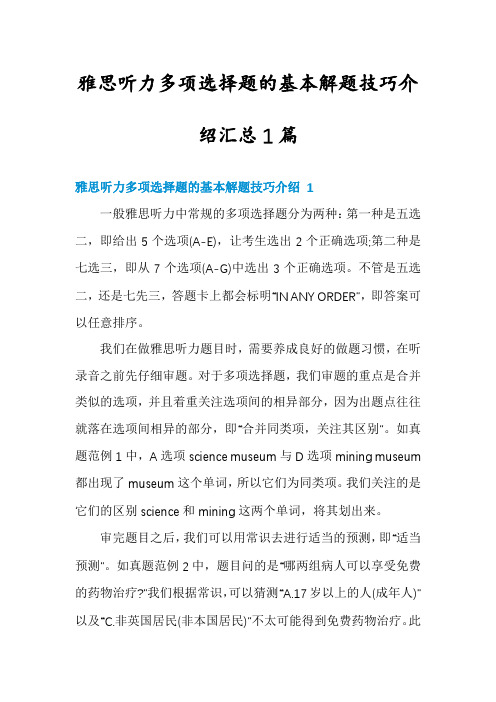
雅思听力多项选择题的基本解题技巧介绍汇总1篇雅思听力多项选择题的基本解题技巧介绍 1一般雅思听力中常规的多项选择题分为两种:第一种是五选二,即给出5个选项(A-E),让考生选出2个正确选项;第二种是七选三,即从7个选项(A-G)中选出3个正确选项。
不管是五选二,还是七先三,答题卡上都会标明“IN ANY ORDER”,即答案可以任意排序。
我们在做雅思听力题目时,需要养成良好的做题习惯,在听录音之前先仔细审题。
对于多项选择题,我们审题的重点是合并类似的选项,并且着重关注选项间的相异部分,因为出题点往往就落在选项间相异的部分,即“合并同类项,关注其区别”。
如真题范例1中,A选项science museum与D选项mining museum 都出现了museum这个单词,所以它们为同类项。
我们关注的是它们的区别science和mining这两个单词,将其划出来。
审完题目之后,我们可以用常识去进行适当的预测,即“适当预测”。
如真题范例2中,题目问的是“哪两组病人可以享受免费的药物治疗?”我们根据常识,可以猜测“A.17岁以上的人(成年人)”以及“C.非英国居民(非本国居民)”不太可能得到免费药物治疗。
此时,五个选项就被缩减成为了BDE三个,考生只需要从这三个选项中选出两个即可,这样__提高了我们的解题效率。
完成审题与预测这两步,下面我们可以边听录音边选出正确选项了。
多项选择题的答案往往具备三种特点:1.答案往往不会使用选项的原词,而是使用其同义替换。
以真题范例3为例,题中的B选项too boring被同义替换成了c hildren don’t actually enjoy the experiment,而C选项too difficult被同义替换成了too ambitious for this age group,题中E选项too long则被同义替换成了wait up to a fortnight,题中F 选项too easy也被同义替换成了elementary,最后一个H选项too dangerous被同义替换成了someone could get hurt。
- 1、下载文档前请自行甄别文档内容的完整性,平台不提供额外的编辑、内容补充、找答案等附加服务。
- 2、"仅部分预览"的文档,不可在线预览部分如存在完整性等问题,可反馈申请退款(可完整预览的文档不适用该条件!)。
- 3、如文档侵犯您的权益,请联系客服反馈,我们会尽快为您处理(人工客服工作时间:9:00-18:30)。
雅思听力选择题解题技巧
1:化零为整,守株待兔
雅思听力多选题:5选2或7选3 例1 剑6 Test 4 Qs 28-30 Which three topics do this term’s study skills workshops cover? A An introduction to the Internet B How to carry out research for a dissertation C Making good use of the whole range of library services D Planning a dissertation E Standard requirements when writing a dissertation F Using the Internet when doing research G What books and technical resources are available in the library
4、迅速阅读题目中的选项部分
5、对待多项选择题,多选和单选的最大区别在于,听多选一 定要注意表示并列关系的连词
4、迅速阅读题目中的选项部分
1)如果每个选项都很短,要注意再回去看看题干中部分的限定性单 词,同时听的时候尽量听清楚细节部分,因为选项短的题目中容易设 置一些陷阱; 2)如果每个选项都很长的话,就要抓紧时间看每个选项不同点,因 为所给看题目的时间可能不够让你看清楚每一个选项的每一个单词, 在这个时候,可以采用双题原则,即听题目的时候视觉按照顺序同时 围绕着两个相邻的选项游动,这样的话就不容易漏听选项; 3)如果一个section中选择题比较多,而且选项又长又来不及听的话, 建议先看看所有题目的提干部分,在听题目的时候采用双题原则来进 行答题。
隐性限定:比如较具体的表达方式或者时间状语从句。
2)注意频率词:frequency, frequent, frequently, common, commonly, usual, usually, scarcely, average, averagely, every ...minutes 等。 3)有时候一些具有实际意义的名词,即实义词,对题目的范围进 行了限定,那么题目就出现了简化的机会,重点关注哪个选项是 出现在这个名词周围。
雅思听力选择题特点
为了考查考生的听力理解能力,雅思听力中存在两大 阻力:Indirect Information间接信息与Trap干扰项。 特别是对于多项选择题,正确选项往往不像,干扰项 往往很像。 间接信息:录音中听到的内容与正确选项中的内容貌 离神合,经常是文字不一致,但意思一致。 干扰项:录音中听到的内容与若干错误选项中的内容 貌合神离,往往是文字一致,但意思风马牛不相及。
思路透析: 乍一看题,有种蒙的感觉,因为选项较多,对于考生的快速阅读能力提出了 一定的挑战。 此时必须冷静,发现其中的规律。经过分析,选项A 、F 都谈到Internet,可 以归为一类;选项B、D、E 都与Dissertation 有关,归为第二类;选项C、G 中都有Library,归为第三类。 根据一定的特点把选项与干扰项进行了归类,根据类似选项形成互相干扰, 我们可以大胆的预测三类中各出一个正确答案,正好组成此题的最终答案。 如此这般的抽丝剥茧能使我们把零零散散的七个选项归为有特点的三大类, 从视觉上感觉已经轻松多了,感觉并不是面对七个毫无关联的选项,而是在 三类中选三个答案。 我们需要做的就是排除同类中的唯一或者最多不超过两个干扰项,写下正确 答案而已(就算是要蒙的话,由于每个正确答案的范围已经从原来的七分之 一变成了二分之一或者是三分之一,准确率不断上升)。
雅思听力选择题解题步骤
1、快速阅读标题,确定题目所在的场景话题 2、看题目要求,知道是单选还是多选,如果是多选题,那 么是从多少个选项中选择几个 3、浏览题目的题干部分,找到能够将题目答案限定到一定 范围的限定性单词,同时听的时候尽量听清楚题目中名词、 动词、形容词、副词、定语和状语
雅思听力课堂(五)
雅思听力之选择题
选择题介绍
雅思听力中的选择题型包括单选题与多选题,是两大基本题型之一 (另一为填空题型)。 考试中同学们对选择题型的普遍感觉是:信息出现速度快,比较杂乱, 因而易错。 选择题可以出现在雅思听力考试中的任何一个部分。 要解决选择题型一定要把握住听力的出题思路,即其核心考查方向: Listening Comprehension(听力理解)。
英语里表示否定的词很多,可以分为两大类:常规否定,也就是 用大家都熟悉的no,not 加以否定;隐含否定,也就是用一些易于 混淆的表否定的词汇来加以否定,包括:few,little,hardly, scarcely,seldom,rare,rarely,以及一些否定的词根等。
5:1, 2, 3, 4, 5,
2:横扫限定,火眼金精
雅思选择题的限制条件可归为三类:时间限定、频度限定、名词 限定 1)时间限定词很多,包括明确限定和隐性限定两类。 明确限定:具体年代, now, past, future, use to, original(ly), soon, so far, recently, current(ly), soon 等;
3:戳穿比较,有的放矢
雅思里的比较分为三类: 直接比较,即题目中包含有比较级和最高级的表达方式的题目;
间接比较,即题目中并没有直接的比较级和最高级,但是有诸如major, majority,main,mainly 等可能会用比较来进行阐述的词汇的题目;
隐含比较,即题干中未包含比较关系词,但是选项内包含比较的题目。 第一类直接比较的题目是最容易解答的,只要听准同样的比较表达方式,答 案很容易得到; 第二类间接比较的题目也不是太难,关键在于掌握major, majority, main, mainly 等提示词并注意它们之间互相同意转换即可; 第三类隐含比较比较难,因为题干虽然无比较,但是选项里有比较的特点, 而且实际听力中又容易出现否定词搭配比较表达出现的形式,使考生的反应 时间和速度受到极大的影响,大大降低了解题正确率。
4:偷天换日,临阵脱逃
“如果你听到的内容几乎和某个选项一模一样的时候,那么这个选 项经常是要被排除的,并不是正确答案。”
之所以匹配度极高却要排除此选项的原因主要有两个:偷天换日, 即偷换主语;临阵脱逃,即肯定变否定。
“偷换主语”主要是指选项的主语与题干中的主语不一致,这样 就造成了录音和选项的匹配度几乎达到了99%,但是就是因为主 语不一致,所以探讨的内容其实风马牛不相及。 “肯定变否定”即录音和选项确实是在讲同一个内容,但是录音 中出现了否定词使得彼此意义恰巧相反,故排除此选项。
第一类:直接数字 直接数字包括一般数字(基数词)、序数词、分数以及百分数等。 这类考题中的数字会直接念出,做对的机率较高。 第二类:间接数字 这类题目中数字并不是直接念出来,而是通过一些比较巧妙的方 法给出。一些数字表达方法,例如couple, dozen, fortnight 等。
